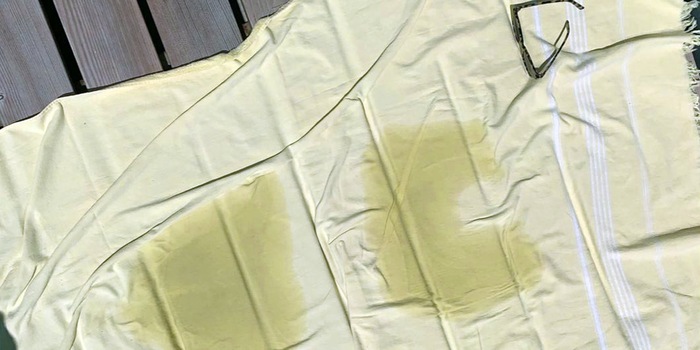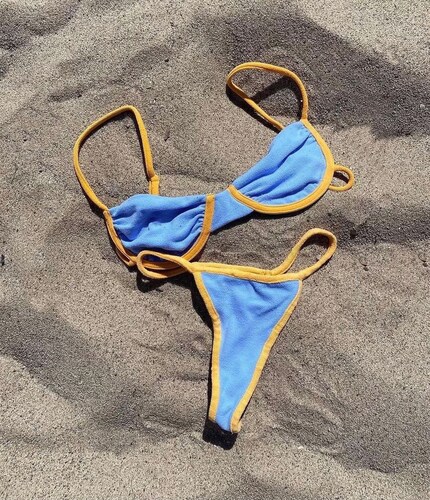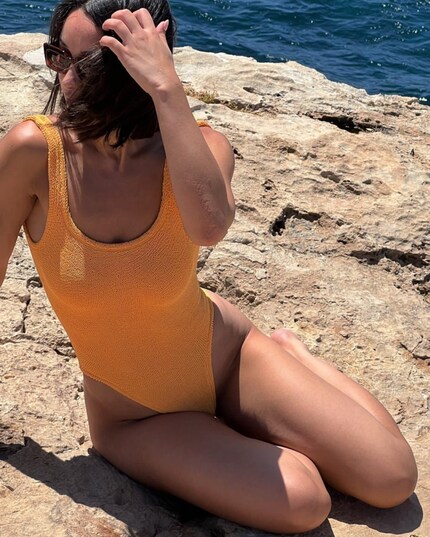
Guide
Swimwear Guide: which fabric suits you?
by Vanessa Kim

Bathing and sunbathing are two completely different disciplines. This becomes especially clear when you choose the bikini or swimming costume made of the "wrong" material.
There was a time when music videos were still relevant. I was a teenager at the time and fascinated by the pop culture works that flickered across my busy TV screen. Among other things, Britney Spears (still pre-conservatorship) was lolling around singing "Don't Let Me Be The Last To Know" while wearing a creamy white crocheted bikini top. It seemed to have made a lasting impression not only on me, but also on the rest of the (teen) world, and so it wasn't long before suspiciously similar models were hanging from the hangers of the relevant clothing shops. Looking like Britney in no time - beach waves, body, career and tanned boy would immediately follow, I was sure - it didn't just sound too good to be true. It was.

As it turns out, crochet bikinis are indeed ideal for rolling around in on the sand in front of your romantic beach hut. However, if you actually plan to go swimming in them, you'll look pretty silly pretty quickly from the worn-out laundry. No, crochet and water are not an advisable combination. And to be honest, this is the case with a surprisingly large number of materials from which - strangely enough - so-called swimwear is made.
If you're looking for support, you're basically in the wrong place. Most crochet bikinis are exclusively suited to rather small breasts that don't rely on underwires, cups, or wide, comfortable straps. In addition, as I said, they react to contact with water. What was just visually pleasantly hugging the female curves now leaches out unattractively, loses all shape and takes an exhaustingly long time to dry again. These are somehow suboptimal attributes for swimwear. If you do it like Britney and stand ankle-deep in crystal-clear water at most, otherwise basking in sand and sunshine on land, this look is still as iconic as it was in 2000. At least I think so. But if you want to plunge deeper into the waves in between, hands off crochet styles that are 100% cotton.
In theory, a bikini made of terrycloth sounds cosy and practical, a towel to put on, so to speak. Of course, there are good reasons why your towel has only ever been used after bathing. The fabric is relatively thick and, above all, absorbent. Like crochet bikinis, terrycloth ones lose their shape quickly and hang down unflatteringly when wet. And don't even get me started on how long they take to dry. Drum: If you're going to the beach bar or just to soak up some sun, team terrycloth. But for actual bathing in the water, I'd always throw a second, different model in the bag.

If I know in advance that I'm going to take home a bladder infection from my day at the beach in addition to a sun-kissed complexion, all signs point to abortion. No, thanks. Unfortunately, when it comes to bikinis and swimming costumes made of the legendary crinkle fabric that Julia Roberts' mini dress in "Pretty Woman" was made of, you can almost be 100 percent sure of that. Because just like their terrycloth relatives, crinkle pieces won't dry out forever. They look cool, no question, and are popular with the masses because of their (alleged) one-size concept. But nothing is more uncomfortable than sitting in soaking wet, cold fabrics for hours after a swim.

Now that was a lot of "no, not like that". But please, what is the perfect material that can withstand extensive swimming sessions and foaming waves? For that question, I'm happy to shake this handy guide out of my sleeve that will give you answers.
Always in the mood for good hits, great trips and clinking drinks.
Practical solutions for everyday problems with technology, household hacks and much more.
Show all